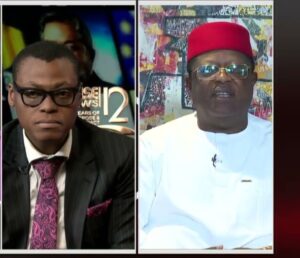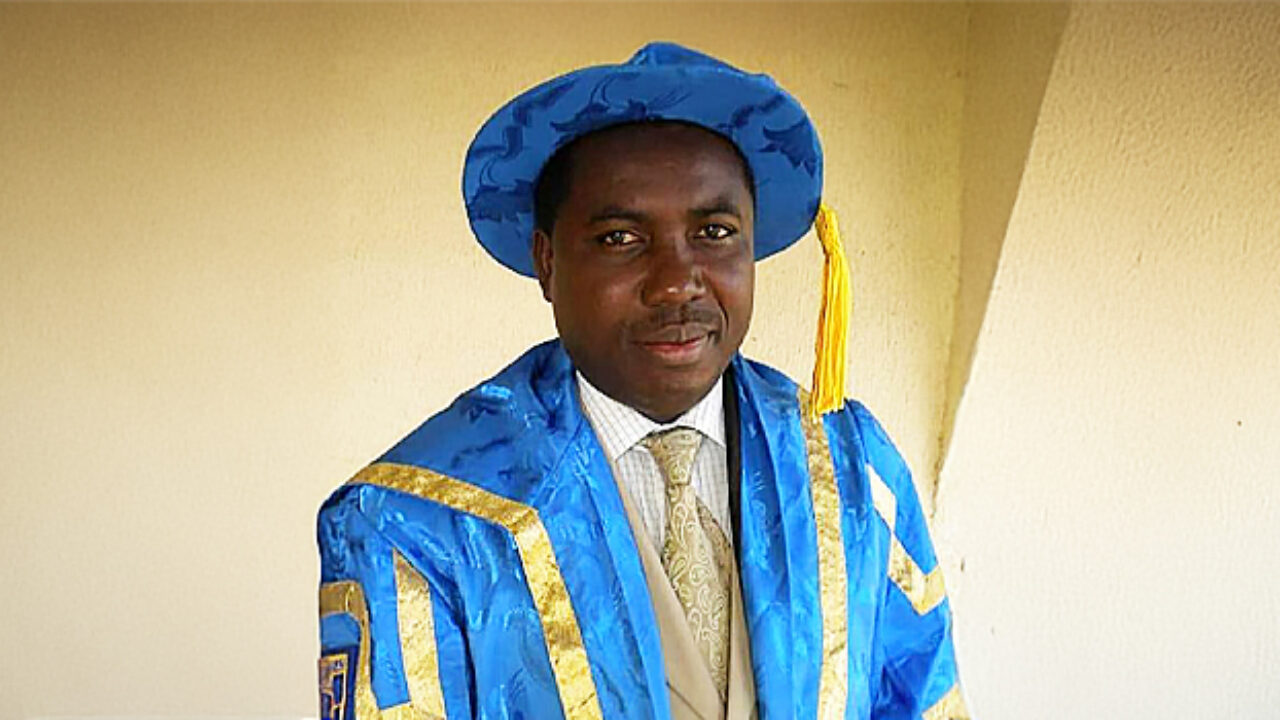Festus Adedayo
Words are sacred, sovereign objects. This sacredness makes them very essential to democratic freedom. In his poem, The Word Is An Egg, great Nigerian poet and dramatist, Niyi Osundare demonstrated the primacy of the word, whether written or spoken. To show the uniqueness of the word, Osundare’s Yoruba people say, like the broken egg, when you break the shell of the word by uttering it, it dissolves into nothingness. Both the one who utters it and the word itself are then never the same. Believing that the word is sacred, Yoruba transfer that sacredness to the African giant pouched rat (Okete). Whatever this giant rat tells the earth when it is digging its hole, it must comply, they believe. The Yoruba chant this belief in incantations that decree abidance to their command. Thus, drawing largely from the cosmology of his people, Osundare said the word predated man and even the world. “In the beginning was not the word/In the word was the beginning” he wrote. In the world of this poet, the word is omnipotent and omnipresent. The word is creation and the creator.
By granting presidential pardon to Herbert Macaulay, Mamman Vatsa, Ken Saro-Wiwa and others last week, the Nigerian president seems to affirm the primacy of the word. Essentially, what unites these three great Nigerians is their use of the word, spoken and written. Macaulay, for instance, apart from being a Nigerian nationalist, politician, surveyor, engineer and architect, he was also a journalist and newspaper founder. It must be said that virtually all nationalists in the colony were journalists. Realizing the power of the word, especially the written word, against colonialists, nationalists crusading for independence not only founded newspapers for this purpose, the word became their weapon of war. Ernest Sese Ikoli, Nnamdi Azikiwe, Obafemi Awolowo, S. L. Akintola etc. were all journalists whose arsenal against the colonizers was the written word.
From 1898 when he disengaged from public service, Macaulay joined the anti-colonial government forces. In the service of this quest, he co-founded the Nigerian Daily News newspaper where he bore his fangs against the colonial government. Some of his pieces included one he entitled “Justitia Fiat: The moral obligation of the British Government to the House of Docemo” and “Henry Carr Must Go”. The newspaper also became the platform he deployed to attack his political opponents and ex-associates like Henry Carr and Adamo Akeju, the Obanikoro of Lagos.
Macaulay’s adversarial journalism eventually led to his travails in the hands of the colonialists. He was notorious for the network of informants he kept who, for handsome fees, passed stolen sensitive information from the colonial government to him. These included minutes from colonial government meetings. He then got them published as exclusive stories damaging to white rule in newspapers that he was acquainted with. For this, Macaulay was nicknamed Wizard of Kirsten Hall.
By the twilight of the 1800s, Macaulay had begun to veer from his profession into activism. He became a lone voice against colonial policies on land, water, and what he felt was non-judicial use of public funds. He was also a member of the Anti-Slavery Aborigines’ Protection Society.
In order to bring him to book due to his trenchant opposition to government, Macaulay’s private survey and architect practice was used to allege fraud and criminal misappropriation of funds from an estate where he was engaged as an executor. The Mary Franklin Estate belonging to a deceased client of Macaulay’s, which he was managing, became an object of litigation. In 1913, he was tried by a Robert Irving, who was the prosecuting counsel in the case, for stealing 350 pounds and imprisoned for two years. Some historians claim Macaulay might have been a victim of vendetta. For all his fights for the people of Lagos, a song was composed in Macaulay’s honour which goes thus, “E ki Macaulay o, Oyinbo alawo dudu” (Macaulay deserves reverence; this white man in black skin). Another Yoruba Sakara genre musician of the Lagos colony of the 1920s and 1930s, Abibu Oluwa, regarded as the first breakout start of that traditional musical genre, recorded a track in his tribute where he sang, “Macaulay Macaulay, Ejòń’gboro”. Ejòń’gboro – Snake on the Street – was Macaulay’s alias.
Both Saro-Wiwa and Vatsa also personified the sacredness of the word. Apart from his environmental activism, Saro-Wiwa was a great writer whose works included television, drama and prose. Same goes for Major General Mamman Jiya Vatsa who was also an accomplished poet and writer.
I went on the above historical journey to situate the Tinubu administration’s perhaps unintended recognition of the sacredness of the word in the president’s last week pardon granted Macaulay, Saro-Wiwa and Vatsa. However, for the administration and a herd of its servile supporters, it is the proverbial favour of Esu Elegbara, the devil. As Esu approbates, it reprobates. Like Esu, the benefit Tinubu gave with one hand, he and his social media lieutenants repossessed with the other a thousand times. Take for instance the television confrontation between Rufai Oseni of Arise TV and Minister of Works, Dave Umahi last week. In the obsession to demonize Rufai, those I label regime boot-lickers took away what looked like harvested gains by the Tinubu administration. By granting those patrons of the word pardon, even though some have said for political reasons, he invariably acknowledged the potency of their word-crusading.

Let us get some fundamentals right. First, Rufai Oseni is one of Nigeria’s most brilliant journalists. I confess to being addicted to watching him. In my 30 years active romance with the word, seldom have I encountered someone in possession of such robustness of mind and an obsessive quest for the good of society. Anchoring his belief on Niyi Osundare’s credo that the word is powerful, omnipotent and omnipresent, the creation and the creator, Oseni uses words to be a guiding principle for those who want a good society.
Last Friday when the Norwegian Nobel committee, in far away Oslo, was announcing Maria Corina Machado as its 2025 Prize winner, my mind went to Oseni, his crusade for a just society and his travails in the hands of Nigerians who have grown luscious inside the sewers of bad governance.
Permit me to state that, substitute Venezuela for Nigeria and the committee could as well have been referring to Rufai Oseni. In his small corner of television advocacy and activism, Oseni, like Machado, challenges monarchical rule dressed in the garb of democracy. He has tirelessly advocated for free elections and representative government. If you read the work of two scholars, Olakunle A. Lawal and Oluwasegun M. Jimo, in their journal article entitled “Missiles from ‘Kirsten Hall’: Herbert Macaulay versus Hugh Clifford, 1922 – 1931” as I did, you would see in Rufai Oseni the Herbert Macaulay spirit.
A motley crowd palace courtiers denigrate Rufai Oseni today for rousing us all against a brand of civilian colonialists, the type Macaulay fought to a standstill. Like Macaulay, Oseni faces intense persecution. Macaulay’s is mostly from Lagos people and the colonial government whose perception of him was that he was an unnecessary pest. Many think same of Oseni, too. If Macaulay had been an anchor on TV as Oseni is, the Tinubu government Rottweilers would have bayed for his blood, too. During Macaulay’s court trial, a local musician called Gbadamosi Bishi composed a song for him which approximates the high level of opposition against colonial rule of the time.
What many do not know is that what Rufai Oseni and his very few fellow travelers on this rarely-traveled road go through in fighting bad governance and entrenched forces of democratic retrogression is significant. You may deplore his method of fighting the self-serving and the “violent machinery of the state”, but you cannot undermine the fact that Oseni is, just like Machado, a “symbol of (our) collective aspiration against an alien government that (doesn’t care for our) welfare.”
The Nobel committee had strong words for those who perceive criticism of the government as adversarial. The committee stated that “what lies at the heart of democracy” is “our shared willingness to defend the principles of popular rule, even though we disagree.” Its description of Machado’s seemingly hopeless Venezuela seems to find mutual validity in Nigeria.
In a country where hero-worship and the belly, rather than principle, dictate the compass of individuals’ stands in the blight of normalcy currently reigning in Nigeria, the word, as represented by the media, plays crucial role as representatives of free speech. The Rufai kind who hold governments accountable is fast becoming extinct. When a Minister of Works appears vague and opaque on the cost of roads under his superintendence on national television, it is the responsibility of a journalist to make the minister lose his appetite. That was what Rufai did. You may not like how he did it but that is business for further discourse. That he courageously did it, without kow-tow-ing to his dollars and grits, Oseni deserves our own Nobel. Erstwhile clan members with whom the likes of Rufai ingressed and egressed through the same aganrandi (a traditional Yoruba door) have recently almost all exited, citing their love for country and how “hate and anger should not blind Nigerians to progress.” The Rufais should be commended for not following the ignominious paths of our brothers, Judas.
Come to think of it, what Rufai demanded was just accountability. If a government awards a Lagos-Calabar Coastal Highway, a 700 km project, for $11–13 billion (₦15.6 trillion) to the self-confessed friend of the president, where his son is a director, methinks this incongruity should raise red flag in the minds of any righteousness-seeking nation. If however you have chosen to live a fawning life of grovelling before your Ali Baba and the Forty Thieves over this matter, why demonize those who are asking questions? Even the governor of Oyo State, Engr Seyi Makinde, an engineer like Dave Umahi, has imputed that his ministerial grandiloquence has no place in accountability. So, why was Umahi waffling on cost of the road per kilometer? The reality is, an average Southwesterner may never ply that coastal road in ten years, whereas he cannot but ply the Ibadan-Ilesa road, for example, which kills the people on a daily basis. But for ulterior motive of self-enrichment, why would a government expend scarce national resources on a white elephant road while abandoning the people to die on consequential roads that have become deathtraps?
We are not all Lagosians who don’t ask questions. Lagos has never asked a single question about the running of their state since 1999. But that is Lagosians’ own problem. What Rufai Oseni and some of us are saying is that, in reality, we are not advocating that the Agatu should not chant the Yoruba traditional oral praise poetry called Rara. Rara is chanted at ceremonies and used as salute in praise of an individual. What we however deplore is the Agatu chanting the praise song of our mother – “Aa ni ki Agatu ma sun rara; k’o sa ma fi ki iya wa”. This fear is raised because Agatu, a Benue State tribe, many of whom lived in the Southwest, were renowned for their predilection of mis-pronunciation while mimicking Yoruba words. In other words, those obsequious fawners of power should not extend their canopy of silence to our side.
The truth is, words are what despots and pretentious lovers of democracy first seek to hold captive. Yet, the word is the most valuable hand-tool of democracy. The choice is however ours: We can continue to demonize the Rufai Osenis and idolize individuals who fawn before regimes, the palace appeasers, courtiers and regime sympathizers like Reno Omokri, Daniel Bwala and their clan. As I told one of them on a Whatsapp platform last week, we will all someday reap the fruits of where we stand.
Tribune
























































